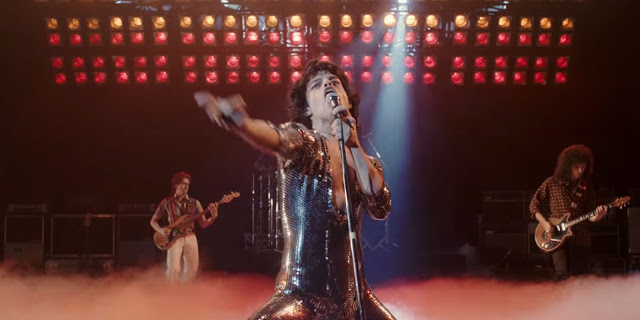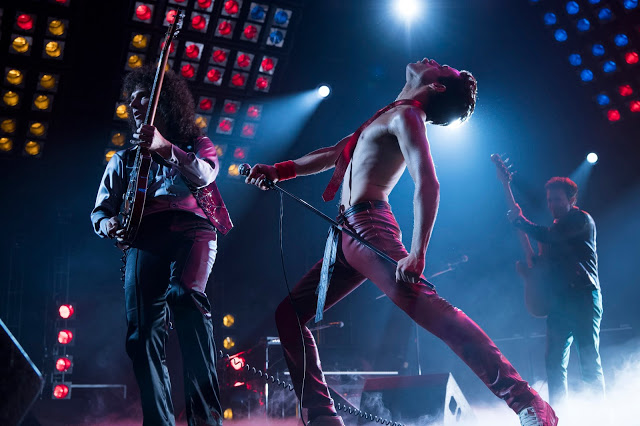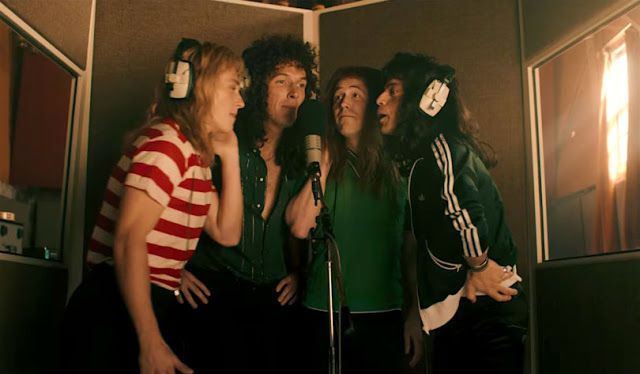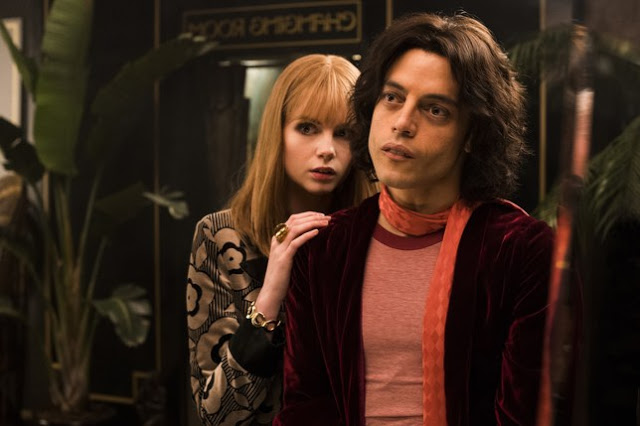Sparring with a grumpy studio executive over the direction of his ascendant band, Freddie Mercury insists that Queen’s new record will have operatic overtones, thereby defying the traditional formula of “Do it again, only bigger.” The suit balks. “I like formula,” he retorts, and well he should; formula has made him money. Bohemian Rhapsody, the new middle-of-the-road biopic about Mercury and Queen, frames this studio head as an out-of-touch buffoon, a crass businessman solely interested in profit and utterly lacking in artistic vision; the band, in contrast, is perceived as constantly knocking down barriers and fearlessly reinventing itself.
The juxtaposition is ironic, because while Bohemian Rhapsody may chronicle 15 years in the life of one of rock-and-roll’s seminal musicians, in terms of ambition and execution, it is entirely on the side of the suit. Which is to say: This movie is pure formula. Take a solitary dreamer with starry eyes and a disapproving dad; introduce him to some pleasant and unmemorable fellow aspirants looking for their own big break; show the group coming together to create some of rock’s classic tunes; follow a montage of their success with a reveal of slowly deepening fissures of dissension; mix in some substance abuse and romantic trauma; conclude with a harmonious reunion that reminds everyone of the unsullied joy of making music. Stuff everything in a blender and press “Play”, then wait for the dollars to start pouring out.
That Bohemian Rhapsody, which was directed by Bryan Singer (sort of) from a script by Anthony McCarten, is such a safe and straightforward account of such an influential and unconventional band is somewhat disappointing. This workmanlike nature does not make it unenjoyable. The film carries few insights or surprises, but it does supply a number of invigorating musical set pieces, as well as the usual entertaining sequences of artistic collaboration and creativity.
And of course, there is the pleasure in watching a talented actor impersonate the mannerisms of a rock god. Not being especially well-versed in Queen’s lore, I can’t speak to the veracity of Rami Malek’s performance as Mercury, but he certainly conveys an irrefutable je ne sais quoi, a quality of indefinable greatness. Outfitted with gigantic prosthetic teeth and strutting across the stage in an array of baroque costumes—tight white tank tops, clingy red leather, spangled spandex—Malek is marvelously flamboyant, a great showman playing an even greater showman. (He even does some of his own singing, though most of what you hear is a combination of remastered Mercury vocals and the impressive pipes of Canadian singer Marc Martel.) He captures Mercury’s extraordinarily ability to connect with his audience, one “Ay-oh!” at a time.
Beyond Malek’s gleefully flashy performance, Bohemian Rhapsody does manage to deliver a few ideas about Queen’s creative process; if the movie is essentially a 134-minute music video of the band’s greatest hits, it at least envisions how those hits came to be. The making of the title track—which is recorded when the quartet decamps to a remote farmhouse, hoping to find inspiration in isolation—is a reliable hoot, with Mercury barking eccentric orders on the way to crafting a historically bizarre ballad. Later, the crowd-stomping anthem “We Will Rock You” is conceived as a deliberate effort to allow the group’s fans to directly participate in its raucous concerts. And we first hear the legendary bass riff that opens “Another Bites the Dust” not in the context of a professional recording session, but as an instrumental snarl designed to get two bandmates to shut up and stop arguing.
The sensation of hearing those songs, as though sung for the first time, is undeniably pleasing. What you will not hear, or see, is any real underlying humanity, any genuine conflict or emotion. It’s a bit unfair to accuse Bohemian Rhapsody of following the trajectory of the cult-classic parody Walk Hard, but there’s an alarming predictability to McCarten’s script, hitting all of the expected beats and treating them not as actual story but as desultory tissue connecting the various musical performances. This aimlessness may stem from the project’s production troubles: Singer was fired midway through filming, replaced by Dexter Fletcher (who’s coincidentally now filming the Elton John biopic Rocketman, slated for release next summer), and while the shift isn’t especially noticeable on screen, that’s less a testament to Fletcher’s adaptability than to the movie’s general lack of personality.
Is the film real life, or is it just fantasy? Who cares? Bohemian Rhapsody has been chastised for twisting the facts to suit its narrative—Mercury didn’t really break up the band to pursue a lucrative solo career, nor did he treat a high-profile performance as a sort of redemption in light of his AIDS diagnosis—but these critiques strike me as petty and misplaced; every biographical picture plays fast and loose with the truth to some extent, and none of the departures here egregiously distorts Queen’s legacy. Similarly, rumors that the movie had de-queered Mercury prove erroneous, given that it openly and repeatedly addresses his homosexuality. No, the problem with Bohemian Rhapsody isn’t that it lightly embellishes the past; it’s that those embellishments aren’t interesting.
Neither is anybody in the movie, beyond its protagonist. Mercury may have been the lead singer of a four-piece ensemble, but here the other members of Queen—played in blandly agreeable performances by Gwilym Lee, Ben Hardy, and Joseph Mazzello—are thoroughly anonymous, lacking any definition or detail. The same is true on the managerial side; Queen is supervised by a rotation of corporate types—two are played by Aidan Gillen and Tom Hollander, both of whose talents are completely wasted—who theoretically possess music-biz savvy but actually don’t say or do much of anything. (An unrecognizable Mike Myers plays the aforementioned studio head; in addition to serving as a commercialized counterpoint to Queen’s unruly genius, he provides the film’s laziest laugh, when he scoffs that nobody will ever head-bang in their car to “Bohemian Rhapsody”, har har.) And while Lucy Boynton offers some tenderness as Mary Austin, Mercury’s lover-turned-friend, she’s ultimately reduced to playing the token supportive female. The only supporting character who makes any impression is the manager Paul Prenter (Allen Leech), a Machiavellian whisperer whose villainy is as preposterous as it is one-dimensional.
Again, all of this conventionality is mildly disheartening, but it hardly ruins the experience of watching Bohemian Rhapsody, which is too brisk and cheerful to be enervating. The film concludes by reproducing Queen’s 20-minute set at the 1985 Live Aid concert, seemingly in its entirety. It’s a shameless indulgence—mamma mia, they let it go on forever—but it’s hard not to get swept up in the crowd’s euphoria, which is only multiplied by Malek’s brio. For better and for worse, this movie gives you exactly what you’d expect. To answer the opening questions posed by “Another One Bites the Dust”: You are ready for this. There is no need to move to the edge of your seat.
Jeremy Beck is the editor-in-chief of MovieManifesto. He watches more movies and television than he probably should.




